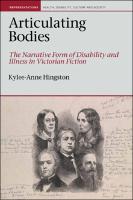Articulating Bodies
The Narrative Form of Disability and Illness in Victorian Fiction (Volume 8)
Author(s)
Hingston, Kylee-Anne
Collection
Knowledge Unlatched (KU)Number
6493Language
EnglishAbstract
Articulating Bodies investigates the contemporaneous developments of Victorian fiction and disability’s medicalization by focusing on the intersection between narrative form and body. The book examines texts from across the century, from Frederic Shoberl’s 1833 English translation of Victor Hugo’s Notre-Dame de Paris to Arthur Conan Doyle’s Sherlock Holmes story “The Adventure of the Crooked Man” (1893), covering genres that typically relied upon disabled or diseased characters. By tracing the patterns of focalization and narrative structure across six decades of the nineteenth century and across six genres, Articulating Bodies demonstrates that throughout the Victorian era, authors of fiction used narrative form as well as narrative theme to negotiate how to categorize bodies, both constructing and questioning the boundary dividing normalcy from abnormality. As fiction’s form developed from the massive hybrid novels of the early decades of the nineteenth century to the case-study length of fin-de-siècle mysteries, disability became increasingly medicalized, moving from the position of spectacle to specimen.
Keywords
Social Science; People With Disabilities; Literary Criticism; Modern; 19th Century; History; Modern; 19th CenturyISBN
9781789624953Publisher
Liverpool University PressPublisher website
https://www.liverpooluniversitypress.co.uk/Publication date and place
2019Grantor
Imprint
Liverpool University PressClassification
Disability: social aspects
Literary studies: c 1800 to c 1900
General and world history


 Download
Download